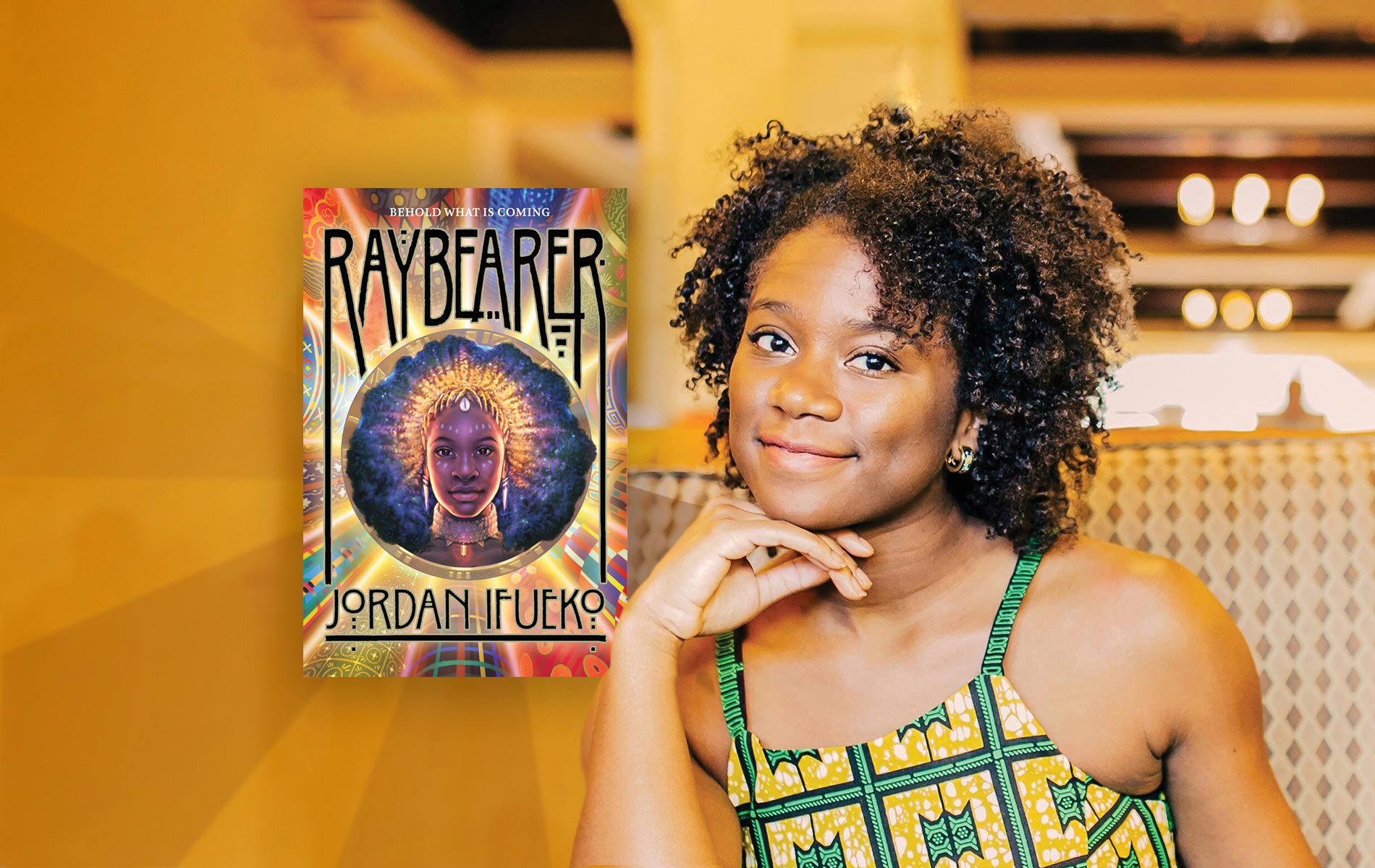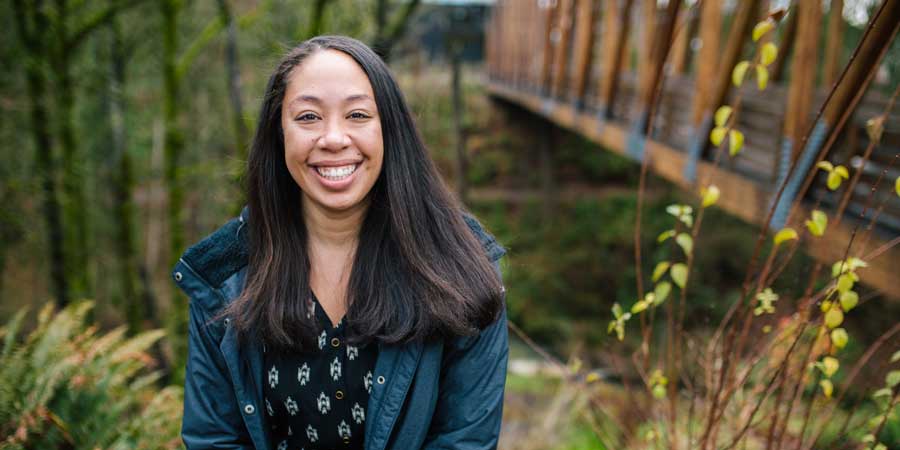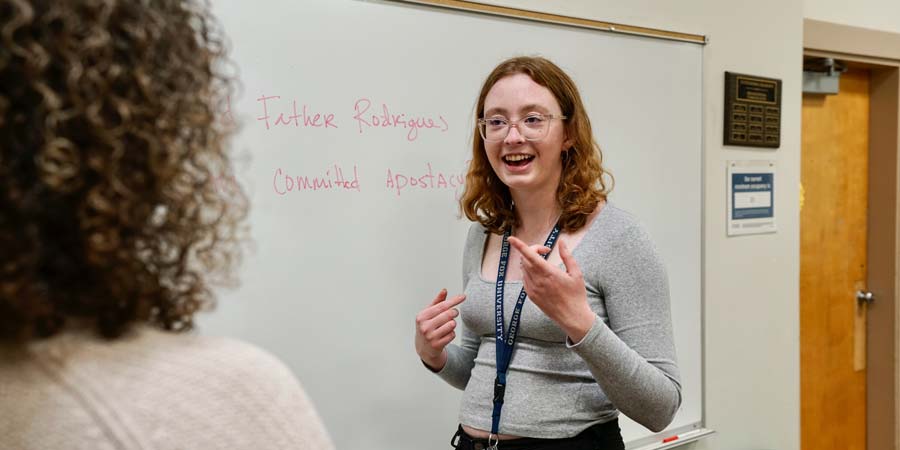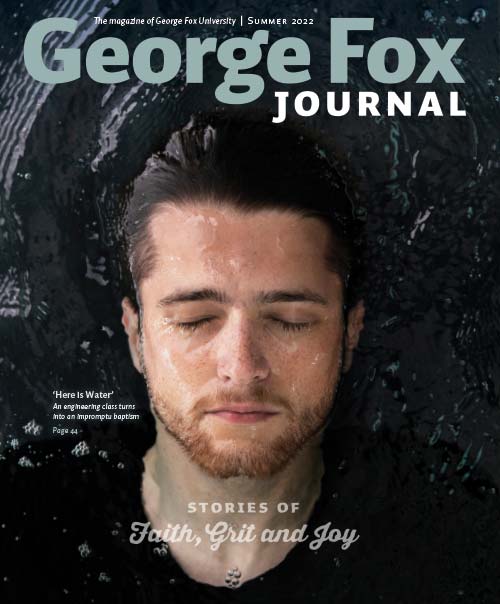
Heroes Like Me
Jordan Ifueko creates stories for a new generation of fantasy fiction readers
As a child, Jordan (Enobakhare) Ifueko (B13) breathed books. She inhaled stories like oxygen, drawing life from the pages of the British literature that crowded her Nigerian immigrant parents’ shelves. Fairy tales and fantasy novels filled her with wonder and painted her imagination in bright shades of magic.
It wasn’t long before Ifueko, brimming with verbs and plots and characters, exhaled stories of her own, crafting worlds in ink and page. She started writing Raybearer – the young adult fantasy novel that would eventually land Ifueko on the New York Times Bestseller List – when she was just 13.
“I’m still not sure what it is in different children’s brains that makes some of them automatically want to recreate what they’re reading, while others are content to just enjoy those worlds,” Ifueko says. “Both of those impulses are natural and great. But for me, as soon as I loved books, I had to make them. I think maybe it’s about loving something so much that you want to be a part of it.”
And yet, for all her love for fairy tales and epic fantasy, Ifueko couldn’t help but feel that the genre refused to love her back. While she was Black, the heroes and heroines of her favorite novels were invariably white. The plots were Eurocentric, set in cool green hills and forests scattered with Cinderella castles – calling to mind the Britain or France of yore, but rarely Nigeria or India.
“I didn’t feel like I even had permission to write stories about people who looked like me until I was much older,” she says.
Fantasy stories, it seemed to Ifueko, were narratives where she did not belong.
When she was 12, Ifueko’s family moved from Los Angeles to Newberg. At 16, she enrolled at George Fox as a freshman. There, she dove headfirst into the English program, devouring literature courses and continuing to hone her craft as a writer, both in and out of the classroom.
“You could see the gifts she had,” recalls English professor Gary Tandy. “She had this whole different level of intensity. She just loved reading and talking about literature so much.”
Even as Ifueko was learning and growing in her love of literature and skill with the pen, she was learning and growing as a person, too. As her worldview expanded and her faith grew deeper, the way she grappled with the complexities of race and representation in literature and history became more complex as well.
“While I was there, George Fox tried to expose the student body to lots of diverse narratives,” Ifueko says. “But being a majority white environment, it was also where my eyes were opened to how insidious imperialism can be.”
Even amidst the joy and wonder of the stories she loved, Ifueko began to notice the tension between competing narratives all around her – more traditional, Western-dominated perspectives squaring off against non-Western traditions in everything from literature to history to theology. It played out not just in her own mind, but in classrooms and conversations across campus.
“Ultimately, I am so grateful for my time at George Fox, because I could see these conflicts happen, and see how many Christians were wrestling through these things,” Ifueko says. “George Fox became a place where it was safe for me to struggle with that. I think if I had gone to a secular university it would have been easier for me to compartmentalize and say, ‘Oh these views that question things, of course they do that, because they’re not Christians.’ Whereas, because most everybody was a Christian within George Fox, it made it easier for me to say, ‘Hey, questioning doesn’t negate faith. You can be someone whose faith is very important to you and still ask really hard questions about things you’ve believed for a long time.’”
All the while, she kept chipping away at the novel she had started as a young teenager. And as Ifueko grew and changed, the book changed with her, transforming from a mirror of the Eurocentric fairy tales on which she was raised into a vastly more complicated – and vastly more interesting – story about a young heroine deconstructing the myths she once believed about empire and power and destiny, and ultimately finding the courage to fight for and build a better world.
After college, Ifueko spent a few years working for an academic publisher, but she kept on writing and dreaming. When one of her short stories was picked up by the Hugo-nominated magazine Strange Horizons, a literary agent reached out to ask if she had written any other fiction. When she offered the first few chapters of her novel, the agent saw Ifueko had something special. Within two weeks, she had a book deal with a major publisher.
The end result, Raybearer, has since become a New York Times bestseller, was named “best book of the year” by numerous publications, including Publishers Weekly, Buzzfeed and People magazine, and was nominated for the prestigious 2020 Nebula Award for Middle Grade and Young Adult Fiction.
“We’re just really proud of her,” Tandy says. “It’s amazing what she has accomplished. But also – especially in this current environment where the humanities are perhaps not as respected as professional degrees – we want our students to know that they can pursue their love of writing, that there are possibilities if they work hard at it.”
These days, Ifueko is still breathing books. Still inhaling graphic novels, young adult fiction and fantasy novels from a growing pantheon of diverse authors. She’s exhaling her own stories, too – stories where heroines who look like her grapple with nuance and struggle for justice in worlds of magic and wonder.
Redemptor, the sequel to Raybearer, was released in August 2021. Netflix has announced it will be adapting the books into a streaming series, while Ifueko herself is working on new young adult and middle grade fantasy books.
When it comes to representation, Ifueko believes the world of publishing and literature still has a long way to go, but she is determined to be part of that change, harnessing the power of story to build a better world.
Looking for more?
Browse this issue of the George Fox Journal to read more of the stories of George Fox University, Oregon's nationally recognized Christian university.



